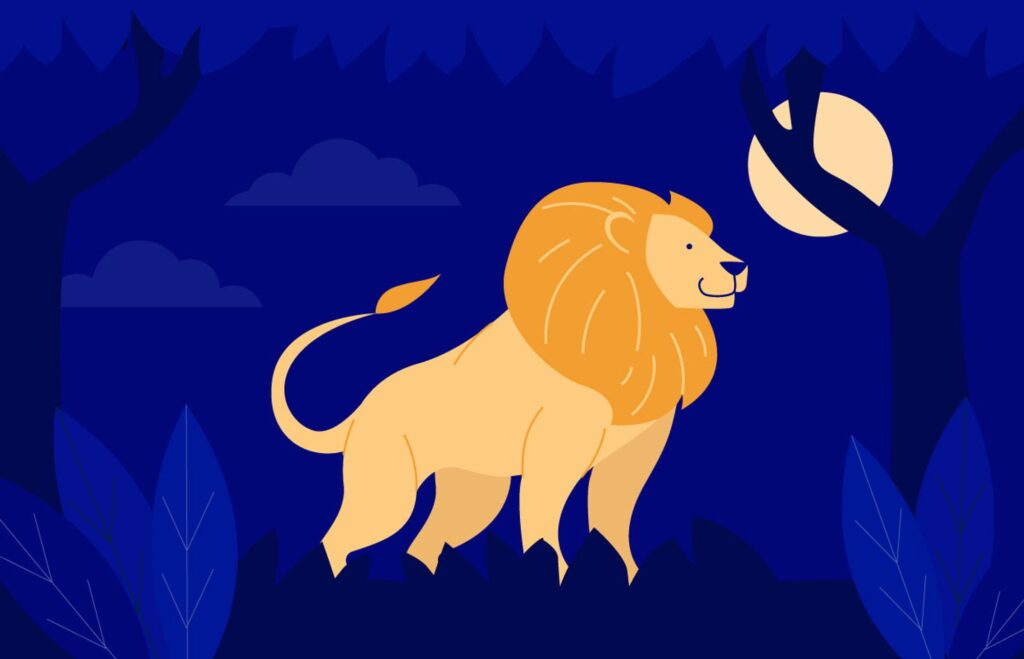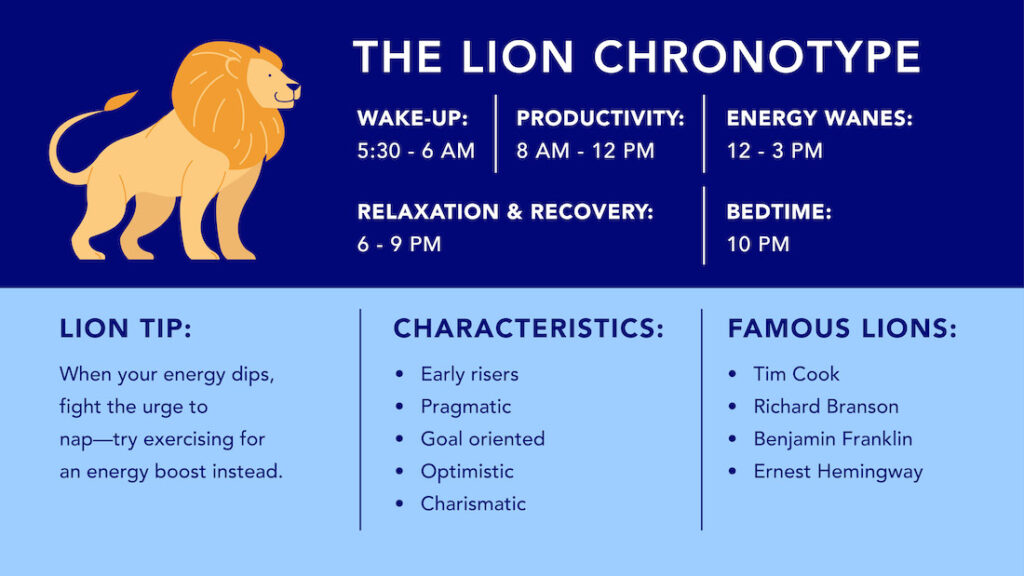
If you’re up with the birds every morning, you’re probably a lion chronotype. The lion chronotype, which was introduced by Dr. Michael J. Breus, PhD, in 2016, follows an “early to bed and early to rise” sleep schedule. These guys often hit the ground running as soon as they wake — no snooze bar needed. And while chronobiology (the study of biological rhythms) is largely focused on sleep timing, it would seem that your chronotype can also play a role in your personality. Ahead we take a closer look at the lion chronotype, lion sleep habits, and a few ways lions can lean into their chronotype to boost productivity and make the most of their day. Not sure what chronotype you are? Take our quick chronotype quiz to find out!
Key Takeaways
- A chronotype is your body’s natural tendency to sleep and wake at certain times.
- Lion chronotypes, also known as larks or morningness chronotypes, are the early risers among us.
- Lion chronotypes should consider scheduling important tasks that require attention and focus earlier in the day and plan for afternoon breaks to help them recharge.
What Is a Chronotype?
According to sleep coach Morgan Adams, MSW, “Chronotype refers to a person’s natural inclination for sleep and wake patterns. It’s the timing of a person’s internal body clock or circadian rhythm that regulates physiological and behavioral processes happening over a 24-hour time period.”
While genetics can determine chronotypes, research shows they can also be fluid. Age, sex, and environmental cues like light, diet, and exercise (all of which regulate your circadian rhythm) can also play a role in your chronotype, and its changes over your lifetime.
While most people think that larks and owls (early birds and late sleepers) are the only chronotypes, new research shows there are actually four distinct chronotypes.
- Lion Chronotypes are the early risers of the group.
- Bear Chronotypes tend to follow the sun’s timing for their sleep and wake schedules.
- Wolf Chronotypes are the night owls.
- Dolphin Chronotypes are often insomniacs who tend to have difficulty falling asleep and staying asleep.
The Lion Chronotype
“A lion chronotype is a term used to describe people who have a strong preference for early mornings,” says Adams. “Lions are typically wired to wake up early and tend to be energetic and [most] productive during the early part of the day.”
About 10 to 20 percent of the population falls into the lion or morningness chronotype. And while wake-up times at 5:30 a.m. may sound like cruel and unusual punishment for some, lions wake up feeling refreshed and ready to rock n’ roll. Morningness chronotypes tend to be older, and research also shows that the lion personality is typically extroverted, conscientious, and pleasant. And finally, this chronotype tends to sleep less on the weekends, and they experience a shorter sleep latency (the time it takes to fall asleep) than other chronotypes.
The Best Lion Chronotype Sleep Schedule
Lion sleep habits tend to follow the same patterns day after day, night after night. This chronotype is typically up with the birds around 5:30 a.m., and as a result, they’re out for the count somewhere between 9 – 10 p.m.
A typical lion chronotype schedule looks something like this.
Wake Up: 5:30 a.m.
As the earliest risers out of all the chronotypes, lions typically wake somewhere between 5:30 a.m. and 6:00 a.m.
Maximum Productivity: 8 a.m. to 12 p.m
Peak performance time for lion chronotypes is in the morning. Lions who know, understand, and work with their chronotype are likely to be found with their head down, blazing through their to-do list between the hours of 8 a.m. and 12 p.m.
Energy Wanes: 12 p.m. to 3 p.m.
After a busy and productive morning, lion chronotypes may find that their tanks are running on empty by midday. While napping may sound like a good idea, lions should consider exercising at this point in their day to keep energy levels high.
Relaxation and Recovery: 6 p.m. to 9 p.m
With all that they’ve accomplished during the day, lion chronotypes relish the early evening hours, often using it as a time to relax and unwind.
Bedtime: 10 p.m.
To ensure they’re well rested come 5:30 a.m., lion chronotypes are likely to be in bed and well on their way to dreamland by 10 p.m.
Tips for Getting Through the Day as a Lion

As a result of their inclination toward waking up early, Adams says, “Lions should consider prioritizing their most important tasks in the morning since that’s the time period they’re most alert and focused during the day.”
Adams adds that lions are high energy in the morning, but that energy often fizzles in the early afternoon. To stay on track and get through the day, she suggests planning short breaks later in the day to rest and recharge while scheduling less demanding activities in the afternoon and evening hours. Below, Adams offers advice on how lions can optimize their mealtimes to get through the day.
Diet and Meal Timing for Lion Chronotypes
Breakfast
Since your energy levels are high in the morning, consider having a fairly substantial breakfast within an hour or two of waking up.
Lunch
Schedule lunch around midday or slightly earlier. This will set you up to have steady energy levels throughout the day and prevent hunger from creeping up.
Dinner
Your appetite may wane in the evening as your energy levels start to taper, but don’t put the meal off. Try to eat dinner a few hours before bed. This allows enough time for proper digestion and better sleep quality.
As for exercise, lion chronotypes should opt for that late afternoon time slot for spin class, as exercise during that time can boost declining energy levels to help them finish the day strong.
FAQs
When should a lion chronotype eat?
Lions should have a fairly substantial breakfast within an hour or two of waking up, lunch around midday (or slightly earlier) to manage energy levels, and dinner a few hours before bed to allow enough time for proper digestion.
When should I exercise as a lion chronotype?
While lions can capitalize on their high energy in the morning and exercise soon after waking up, they can also try exercising in the afternoon to boost waning energy levels.
The Last Word From Sleepopolis
Chronotype is your body’s natural inclination to sleep and wake at certain times. Genetics can dictate your chronotypes and change over your lifetime due to age and environmental cues like light exposure. Lion chronotypes wake up early and go to bed early. Peak performance time for lion chronotypes is in the morning, and energy often wanes by the afternoon.
Sources
Kalmbach DA, Schneider LD, Cheung J, et al. Genetic Basis of Chronotype in Humans: Insights From Three Landmark GWAS. Sleep. 2017;40(2):zsw048. doi:10.1093/sleep/zsw048
Heyde, I., Oster, H. Differentiating external zeitgeber impact on peripheral circadian clock resetting. Sci Rep 9, 20114 (2019). https://doi.org/10.1038/s41598-019-56323-z
Kalmbach DA, Schneider LD, Cheung J, et al. Genetic Basis of Chronotype in Humans: Insights From Three Landmark GWAS. Sleep. 2017;40(2):zsw048. doi:10.1093/sleep/zsw048
Randler, C., Faßl, C. & Kalb, N. From Lark to Owl: developmental changes in morningness-eveningness from new-borns to early adulthood. Sci Rep 7, 45874 (2017). https://doi.org/10.1038/srep45874
Randler, C., Schredl, M., & Göritz, A. S. (2017). Chronotype, Sleep Behavior, and the Big Five Personality Factors. SAGE Open, 7(3). https://doi.org/10.1177/2158244017728321
Adams, Morgan. Personal Interview. June 7, 2024.


























